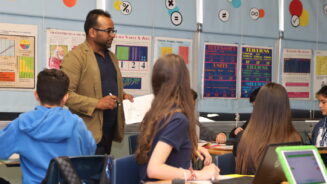A Promising Start for Personalized Learning in Miami-Dade

On January 29, 2025, the National Assessment of Educational Progress, known as the “Nation’s Report Card,” released its test scores for fourth- and eighth-grade students across the United States.
The results were dismal. The decline in eighth-grade math was the worst recorded since the assessment began, in 1969. No school district in the country exceeded its 2019 scores in any grade or subject. Five years since the start of the pandemic, there has been no real improvement in the immense educational deficit brought on by COVID, in which American public-school students lost more than half a year of learning in math and reading, erasing two decades of earlier progress.
Viewed in a global context, the situation appears even more dire. Newly released scores from the Program for International Student Assessment (PISA) show the math scores of fifteen-year-old American students falling farther behind their peers in other high-income, industrialized countries—an alarming trend for the nation’s future competitiveness in an increasingly technology-driven world.
In response to the crisis, Griffin Catalyst further expanded its support for programs around the country that mobilize and study one of the most effective tools in today’s educational arsenal: individualized, high-dosage tutoring. A three-year, $9-million grant to the University of Chicago’s Education Lab is supporting a large-scale math tutoring program in Miami-Dade County, the global headquarters of Citadel and home of its founder Kenneth C. Griffin. In addition to support for implementing personalized learning for students in Miami-Dade, this gift enables the district to join a national study that aims to generate rigorous evidence about how to expand this approach.
Who We’re Supporting
In 2021, Griffin Catalyst joined with other education funders to launch Accelerate, a personalized learning initiative designed to combat pandemic-related learning loss. With an initial $15-million gift, Accelerate, together with national research program called the Personalized Learning Initiative (PLI), aimed not only to assist students around the country but to rigorously evaluate the impact of different models of individualized instruction.
Now, with Griffin Catalyst’s support, Miami-Dade County is joining this national initiative, partnering with UChicago’s Education Lab, PLI, and Accelerate to bring personalized learning to its middle school students. Though the approach can be applied to every district across the country, it is especially crucial in Miami-Dade, where 40percent of the district’s 320,000 students are currently scoring below-proficient in math. Launched with nine middle schools across Miami, this work has now expanded to eighteen schools, reaching over 2,700 middle school students this year.
Why It Matters
High-dosage tutoring, or individualized instruction, addresses a critical challenge in public education. By and large, our schools are designed around teachers instructing students at the same grade level. If a student falls behind, there is no systematic way to intervene, as even the most committed public-school teacher with thirty students cannot be expected to focus on their grade-level content and to attend closely to those children not keeping up. High-dosage tutoring solves this challenge, providing an individualized means to help students who have fallen behind to catch up to grade level, so that they can reengage with regular classroom instruction.
In Miami-Dade, the program follows the core tenets that have been demonstrated to work elsewhere: tutoring sessions are regular, frequent, and held during the school day, not after school; they focus on primary coursework, not homework; and they employ qualified staff to guide students in small-group settings. Students receive twenty to thirty minutes of personalized support two to three times a week, combining tutor-led sessions, teacher-led instruction, and use of computer-assisted instructional technology, personalized to their needs.
What’s the Impact
In addition to its primary mission of assisting students and teachers, the initiative is also focused on generating rigorous evidence about the impact of different models of personalized learning, determining which elements are working best for which students. The initial results from the 2023-24 school year—when, with the program just starting, students received only four months of tutoring in the spring—suggest small but promising improvements in students’ end-of-year math test scores. The amount of learning gained per minute of tutoring (measured by test scores) has already exceeded the team’s previous experience in Chicago, where a series of randomized controlled trials found that this approach generated an additional two to three years of math learning in a single year. The hope is that the research team will see further gains in student learning once a full year has been completed.
Building on the initial success of the program, Miami-Dade is now expanding the program to additional schools and students across Miami-Dade, to ensure that even more students in the district have the support they need to recover from COVID learning loss and succeed academically.
For Griffin Catalyst, the effort in Miami-Dade’s schools represents not only an extension of its commitment to South Florida but a valuable opportunity to demonstrate what is possible in public schools when educational approaches meet students where they are. The effort builds on Griffin Catalyst’s broader commitment to finding ways to scale these promising programs to meet our national needs—critical to improving the lives of an entire generation of young people, and helping to ensure America’s future.
